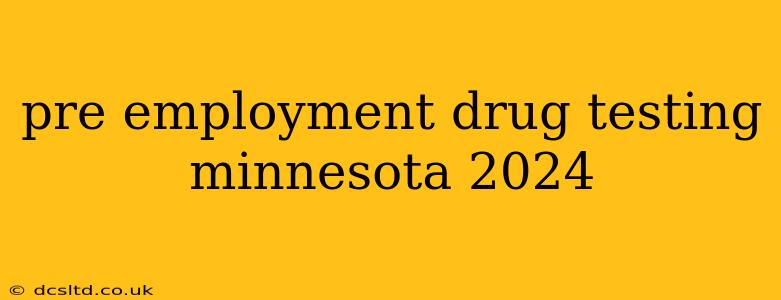Pre-employment drug testing in Minnesota is a complex issue, governed by a combination of state and federal laws, as well as company policies. This guide will help you understand the current landscape of drug testing in Minnesota workplaces in 2024.
What is pre-employment drug testing?
Pre-employment drug testing is the process by which an employer screens potential employees for the presence of illegal drugs or controlled substances in their system before offering them a position. This testing is typically done through urinalysis, but other methods like hair follicle testing or saliva testing may also be used.
Is pre-employment drug testing legal in Minnesota?
Yes, pre-employment drug testing is generally legal in Minnesota. However, there are limitations and considerations. Minnesota, like many other states, doesn't have a law specifically prohibiting pre-employment drug testing. The legality hinges on factors such as the job's safety sensitivity, the employer's policies, and the methods used for testing.
What types of jobs are most likely to have pre-employment drug testing?
Certain professions that involve safety-sensitive duties are more likely to mandate pre-employment drug screening. This includes:
- Transportation: Truck drivers, pilots, and other transportation workers are frequently subject to drug testing due to public safety concerns.
- Healthcare: Hospitals and other healthcare facilities often require drug testing for nurses, doctors, and other medical professionals to ensure patient safety.
- Construction: Construction jobs, especially those involving heavy machinery, frequently implement drug testing to prevent accidents.
- Public Safety: Police officers, firefighters, and other public safety employees are often subject to rigorous drug screening.
What drugs are typically tested for in pre-employment drug screenings in Minnesota?
Commonly tested substances generally include:
- Marijuana (THC): While the legal landscape surrounding marijuana is evolving, many employers still include it in their pre-employment screenings.
- Cocaine: This remains a common target in drug tests due to its potential to impair judgment and performance.
- Opiates (e.g., heroin, morphine, codeine): These substances are often included in screenings due to their addictive nature and potential for impairment.
- Amphetamines (e.g., methamphetamine): These stimulants can affect concentration and decision-making.
- PCP: This hallucinogen significantly impairs cognitive function and motor skills.
What are the Minnesota laws regarding reasonable suspicion drug testing?
While pre-employment testing is generally permissible, random drug testing or testing based on reasonable suspicion requires a carefully considered approach. Employers should have a clear and consistently applied policy, with a reasonable basis for suspecting drug use before conducting such testing. Arbitrary or discriminatory testing could lead to legal challenges.
What are my rights if I fail a pre-employment drug test in Minnesota?
If you fail a pre-employment drug test, the employer generally has the right to withdraw a job offer. However, it's crucial to understand that:
- You have the right to know the results of your test.
- You have the right to challenge the results, potentially through a retest or by contesting the accuracy of the testing methodology.
- The employer must follow their established policies and procedures fairly and consistently.
Can an employer require hair follicle testing as part of pre-employment drug screening in Minnesota?
While not as common as urinalysis, hair follicle testing is generally legal in Minnesota as long as the employer follows established procedures and respects the employee's rights. However, it's advisable to research the specific testing protocols used by the employer.
Are there any exceptions to pre-employment drug testing in Minnesota?
While not explicitly stated in law, certain accommodations may need to be made for individuals with legitimate medical reasons for using prescription medications that could trigger a positive test result. This should be handled on a case-by-case basis, with appropriate documentation and transparency.
What are the implications of a positive pre-employment drug test?
A positive result typically leads to the withdrawal of a job offer. Employers should outline these implications clearly in their pre-employment policies.
This information is for general guidance only and should not be considered legal advice. If you have specific questions or concerns about pre-employment drug testing in Minnesota, you should consult with an attorney specializing in employment law. The legal landscape is constantly evolving, and staying informed is crucial.
